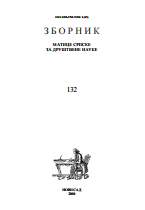МАЂАРИ У ОЧИМА СРБА ИЗМЕЂУ ДВА СВЕТСКА РАТА
PERCEPTION OF HUNGARIANS BY THE SERBS BETWEEN THE TWO WORLD WARS
Author(s): Gojko MalovićSubject(s): Culture and social structure , Interwar Period (1920 - 1939), Identity of Collectives
Published by: Матица српска
Keywords: Serbs; Yugoslavia; Vojvodina; Hungarians; Hungary; stereotypes; prejudices; statements;
Summary/Abstract: Serbs and Hungarians are neighboring nations for more than a millennium. Over the course of last couple of centuries, due to historical circumstances, a substantial part of the Serbian population has been intermixed with Hungarians. Their mutual relationship has resulted in more than enough historically memorable events. Out of the conflicts of World War I, Serbs came out as the victors while Hungarians were on the side of the defeated. Consequences of the war in which Serbs and Hungarians fought each other left deep wounds on their mutual relationship. The devastating war blows and hardships which Hungarians brought onto Serbs during World War I have contributed to a certain level of distrust which Serbs felt towards Hungarians between the two world wars. This condition has largely influenced mutual sentiments of both peoples. During the period between the two world wars, Serbs acquired some new attitudes, but even more so strengthened the old ones they have had towards Hungarians. Serbs realized that Hungarians kept their national pride even in the period between the two wars, and that the Hungarian attitude towards Serbs has undergone certain change. The territorial dispute between Hungary as the national state of Hungarians, and Yugoslavia as a country predominantly populated by Serbs, represented the major obstacle and a source of misunderstanding between the two nations. The attitudes of the wider Serbian population towards Hungarians between the two wars are harder to apprehend because there was hardly any such research or analysis done in this period. What is available, however, are various personal i.e. subjective opinions recorded by individual Serbian intellectuals of various profiles of the time. They have acquainted themselves and, to a certain extent, studied both Hungarians who lived in Hungary and the Hungarian national minority who lived in Yugoslavia, mainly throughout the multinational region of Vojvodina. Between the two wars, Serbs held Hungarians in high esteem as serious people who, aside from some warlike and crude traits, possess good work habits, sensibility and integrity. This is evident in the fact that in this period Serbs did not come up with a single pejorative or insulting song, witticism or aphorism in regards to Hungarians. For the purpose of greater understanding and even closeness between the two nations in the future, it would be beneficial to carry out a more extensive research into the mutual relationship of Serbs and Hungarians, as well as of their respective cultural accomplishments, not only in the period between the two wars, but in other periods as well.
Journal: Зборник Матице српске за друштвене науке
- Issue Year: 2010
- Issue No: 132
- Page Range: 7-23
- Page Count: 17
- Language: Serbian

